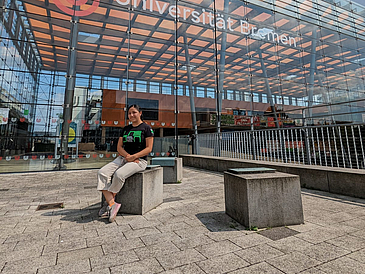From May 8th to July 8th 2023, I carried out a research stay at the University of Bremen in the HMI group of Prof. Dr.- Ing. Luccio Colombi Ciacchi. Under the supervision of my host, Dr. Susan Köppen, the research was focused on the study of a hybrid interface based on a low-cost semiconductor oxide, i. e. ZnO, and a pesticide highly used worldwide which has generated multiple environmental concerns, i. e. chlorpyrifos. For this purpose, molecular simulations of such a hybrid interface were performed by means of the density functional theory (DFT) specifically using the Quantum Espresso program as a tool to generate fundamental information on the adsorption mechanisms and conditions occurring at the ZnO/ chlorpyrifos interface. The outputs of this research stay, complement and support our observations obtained so far experimentally and computationally by the LAIDEA work-team in Mexico led by Dr. Alejandra Castro-Carranza, and jointly with the HMI group in Germany. Furthermore, our joint results are aimed to contribute to the development of sustainable low-cost sensors for environmental applications, of benefit for both countries.
Personally, this research stay has allowed me to learn a lot about computational molecular systems, and to gain experience to continue our joint work exploring different interfaces based on semiconductor oxides and other pollutants for sensing applications. This, in the framework of the Bremen-Mexican Network for the Development of Sustainable Technology for Environmental Apps. (bremex-steaps.net).
I would like to acknowledge the friendly working atmosphere at the HMI group, whose members were always open to discussion and willing to help in whatever they knew, as well as to explain the different theoretical parameters that became complicated in the simulations. Particularly, I would like to thank Dr. Susan Köppen and Eric Macke for all their support in this project, and for the many fruitful discussions.
I gratefully thank MAPEX and International Office for giving me the opportunity to do this research stay at the University of Bremen which has added a great value to my personal and academic development.
Finally, I deeply acknowledge Prof. Dr. Jürgen Gutowski and Dr. Alejandra Castro-Carranza (thesis supervisor and Research Ambassador of the University of Bremen for Mexico) for their support, guidance in the preparation of this project, and the contact and initial recommendation to be hosted at the HMI group.


